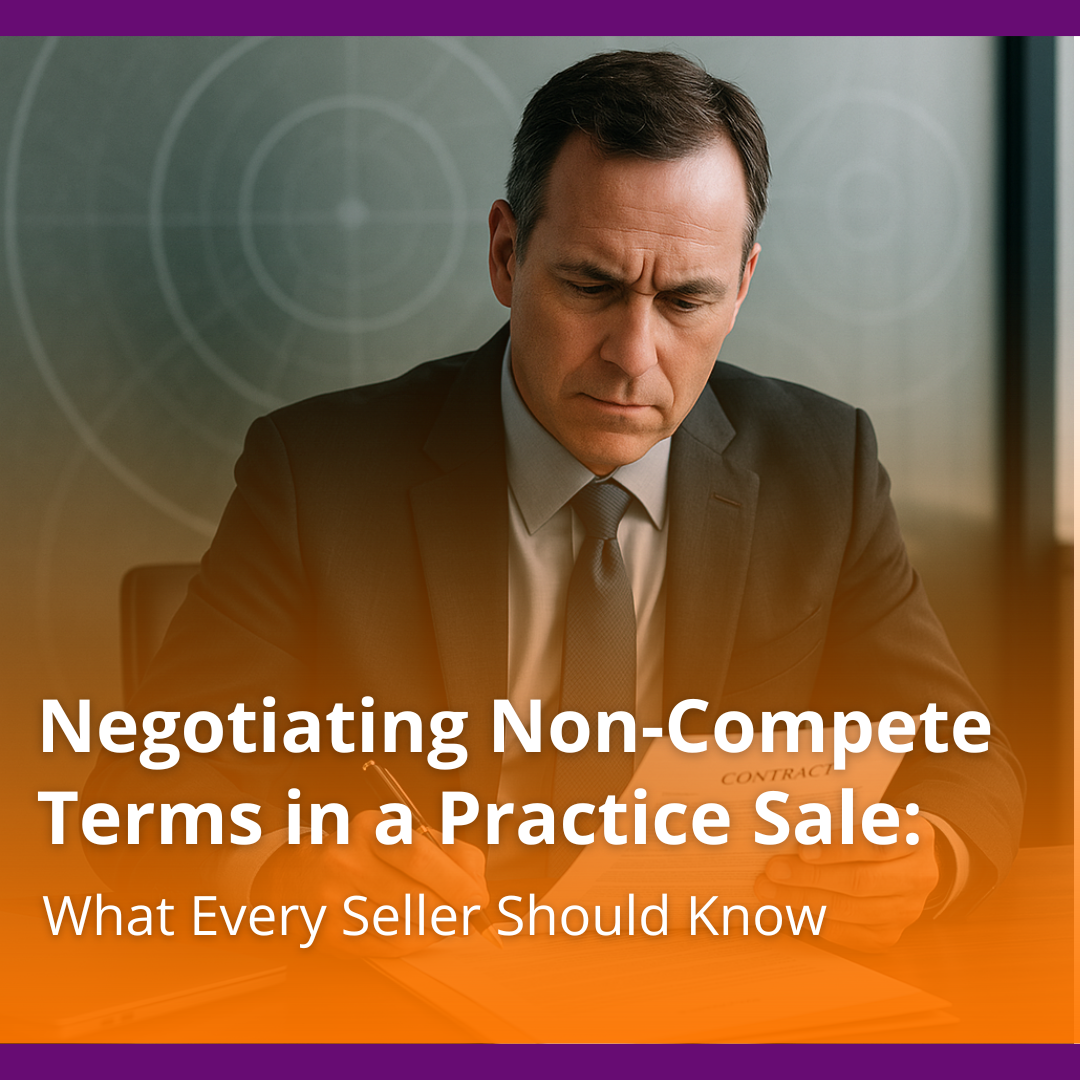How to Know If You’re Emotionally Ready to Sell Your Advisory Practice
You have pictured the day you sell your advisory practice. The deal closes. The pressure lifts.
Comprehensive, data-driven valuations and comparative equity analyses to accurately price your practice, establish market benchmarks, and support informed decision-making.
Comprehensive M&A guidance encompassing deal structuring, negotiation strategies, market listings, and transaction closings.
Comprehensive systems, targeted coaching, and in-depth assessments designed to optimize operational efficiency and enhance advisory team effectiveness.
Strengthen continuity through the implementation of formal continuity agreements, the establishment of legal entities, execution of enforceable legal contracts, and securing appropriate capital resources.
7 min read
 Anthony Whitbeck, CFP®, CLU®
September 19, 2025
Anthony Whitbeck, CFP®, CLU®
September 19, 2025

Thinking about selling your practice? Before you sign, ask yourself: could that non-compete clause cost you your next opportunity, your income, or your career flexibility?
As of April 2024, the Federal Trade Commission estimates that around 30 million U.S. workers, roughly 20% of the labor force, are bound by non‑compete agreements. That includes many business owners who didn’t fully grasp the career limitations they were signing away until it was too late.
If you're a seller, that clause isn’t just contract language. It can define what your next chapter looks like. In this guide, you'll get:
This isn’t just a transaction. It's your exit strategy. Let’s make sure you walk away with freedom, not restrictions.
Non-compete agreements are standard in practice sales, but many sellers underestimate their impact. These clauses can limit your ability to stay active in your profession after the sale.
If drafted poorly, they can shut down future opportunities you didn’t realize you were giving up. Understanding what these clauses cover and what’s actually enforceable is critical if you want to protect your next move.
A non-compete clause is a restrictive covenant that prevents the seller from working in a similar business within a specific geographic area and time period after the sale. It’s designed to stop sellers from undercutting the buyer by taking back clients or competing in the same market.
These clauses usually apply to more than just owning a competing business. They can also restrict employment, consulting, or even passive roles. Because buyers are purchasing not just assets, but goodwill, these clauses are often considered part of the sale’s total consideration.
Buyers view the non-compete clause as non-negotiable because it protects the very asset they’re acquiring. Without it, the seller could re-enter the market, jeopardizing client retention, referral relationships, and the overall value of the business. The clause isn’t meant to punish the seller. It exists to maintain continuity and client trust after the sale.
Most non-compete clauses focus on three factors. Terms typically include a 5 to 15-mile radius, a 2 to 5-year restriction, and limits tied to your current specialty or client base.
Even if terms seem standard, they must still be reasonable, based on the practice’s reach, specialization, and actual competition risk. (American Bar Association)
A non-compete limits where and when you can work. A non-solicitation clause limits who you can contact. These clauses often restrict the seller from reaching out to former clients, staff, or referral partners, even if you're not competing directly.
And unlike broader non-competes, non-solicit clauses are often easier to enforce. These terms often limit more than sellers anticipate—sometimes more than the non-compete itself.
A non-compete clause must protect the buyer’s investment without being so broad that it blocks the seller’s ability to earn a living. If it’s overly broad or vague, a court might strike it down—but only if challenged. These clauses must be challenged, and enforceability often depends on where and how the business sale took place.
As of August 2025, states like California, Oklahoma, and North Dakota ban most non-competes, even in the context of business sales. Others, such as Texas and Florida, allow them if they’re narrowly tailored. Local enforcement also varies, making jurisdiction a major factor in how enforceable a clause really is.
Before you sign a non-compete, get legal advice from someone who understands your state’s position and recent case law. A clause that works in one city could be void in another.
Courts typically assess three elements:
Clauses that go beyond protecting goodwill, proprietary info, or client relationships are more likely to be challenged, and possibly rewritten by the court.
Courts may strike down or modify a clause if it is vague, overly broad, or untethered from a legitimate business interest. For example, banning a seller from working in an unrelated field, or applying a 50-mile restriction when the practice only served a 10-mile market, is unlikely to stand.
Judges may “blue-pencil” the clause—editing terms to make them enforceable—but this is far from guaranteed. It’s smarter to negotiate clean, reasonable terms upfront than to rely on litigation after the sale.
Not all lawyers catch red flags in restrictive covenants. You need someone experienced in practice transitions and the enforceability of non-solicitation agreements, activity restrictions, and geographic scope. A qualified advisor will:
Legal missteps here can cost you future income, career options, and years of frustration. Don’t treat this clause like standard boilerplate, because it isn’t.
You're not just finalizing a business sale. You're setting the terms of your professional future. The non-compete clause isn’t a throwaway detail. If it's too broad, it can quietly restrict your livelihood for years. A well-negotiated, enforceable clause gives you the freedom to pivot without risking a legal violation.
Start with clarity about your next move. Will you relocate, teach, consult, or launch a new practice with a different focus? These decisions should directly inform what you're willing to accept in a non-compete. For instance, if your post-sale plans don’t overlap with the buyer’s market, push for a tighter radius or a more narrowly defined scope of services. A reasonable agreement should match the market area served by the business, not restrict unrelated career moves.
Non-compete language should be precise. Push for clear definitions of what “competition” actually means and ensure the geographic restriction aligns with the business’s actual footprint. If the buyer proposes vague terms like “substantially similar services,” ask for clarification. If the clause extends beyond three years or includes regions where the practice had no presence, question its necessity. These details matter. Courts tend to strike clauses that overreach, but you shouldn’t rely on that after the fact.
If a full non-compete feels too restrictive, suggest alternatives that still protect the buyer’s interests. A non-solicitation agreement, for example, may prevent you from targeting clients or staff without barring you from working entirely. Another approach is a “step-down” clause, where the restriction gradually loosens over time. Some sellers even negotiate a short-term consulting role, which allows for a smoother transition and makes enforcement more practical. These options signal that you're willing to protect the buyer’s position without sacrificing your own career.
This is not a clause you should draft or review alone. A broker familiar with practice transitions can help align terms with the realities of the deal. A law firm experienced in restrictive covenants can flag overreaches, suggest enforceable alternatives, and ensure the clause reflects your goals. Vague, one-sided terms can lead to costly litigation or years of lost income. A non-compete should be strategic. Not a trap.
Many sellers underestimate how binding these clauses can be until it’s too late. A noncompete agreement is more than legal fine print; it is a restriction that can follow you long after the sale of a business. If the terms go beyond what is reasonable in scope or geographic reach, the clause may be unenforceable.
Failing to read the fine print:
Some clauses define “competition” so broadly that consulting, part-time work, or even silent ownership could violate the agreement. This is especially risky when the sale involves goodwill or trade secrets. Review every word to ensure the agreement reflects your actual role after the transfer.
Overlooking non-solicitation language:
Non-solicitation agreements can block you from reconnecting with clients or staff, even beyond the area served by the business. These clauses are often easier to enforce than non-competes and can quietly limit your ability to rebuild a network.
Agreeing to overly broad terms:
A decade-long, multi-specialty restriction over a 25-mile radius is rarely enforceable. Courts assess whether the clause is tied to the business within a certain geographic area and whether it protects legitimate interests, not whether it appears “standard.”
Assuming all terms are non-negotiable:
Most clauses can be negotiated. With strategic edits or creative alternatives, sellers can protect their livelihood without threatening the buyer’s investment. If you are ready to sell your practice, do not sign a non-compete without reviewing what the agreement must and must not include.
At Advisor Legacy, we do more than facilitate deals—we help sellers protect their future. A non-compete agreement is one of the most overlooked risks in a business sale, and mishandling it can limit your options after the transfer. That’s why we make them a central focus in every practice transition we support.
We start by helping you define your post-sale goals, whether that means retiring, relocating, or starting something new. From there, we shape non-compete terms that support those goals rather than block them.
Our team flags clauses that are overly restrictive, vague, or out of sync with the value of the business being sold. By identifying legal and financial red flags early, we help reduce surprises at closing and avoid terms that may be unenforceable.
We work closely with your attorney and the buyer’s team to ensure non-compete language is clear, fair, and aligned with the intent of the deal. This keeps the negotiation process moving while protecting your position strategically.
Our role doesn’t end at closing. We focus on your long-term outcome, making sure the agreement supports your ability to consult, relocate, or reinvent your career. That’s the core of our legacy planning approach. Learn more about our practice sale services for sellers.
A non-compete agreement may look like a standard part of the sales paperwork, but it carries long-term consequences. It defines how and where you can continue your career after the business changes hands.
Sellers who treat these clauses as negotiable, not fixed, are better positioned to protect their goals. With the right strategy and guidance, an effective non-compete can safeguard the buyer’s interests without limiting your future.
Contact Advisor Legacy to review your non-compete agreement before finalizing your sale.
Anthony "Tony" Whitbeck, CFP®, CLU®, is CEO and Owner of Advisor Legacy. He began his career as a financial advisor in 1989 and later shifted to coaching, where he’s guided more than two hundred advisory practices through growth, valuation, and succession. Tony leads Advisor Legacy’s certified third-party valuation engagements and coordinates lending and legal partners to streamline transactions. His articles focus on building transferable enterprise value, mapping internal vs. external exits, and avoiding common succession pitfalls. Drawing on decades of in-the-trenches experience, Tony provides practical, compliance-friendly guidance advisors can use right away.
Receive timely articles, tip sheets, events, and more right in your inbox.

You have pictured the day you sell your advisory practice. The deal closes. The pressure lifts.

Selling a company is often the largest financial event of a business owner’s life. Yet most exit conversations still revolve around valuation and...

Are you preparing to sell your business with a team you want to keep intact? Then you’re already thinking ahead. The moment a sale is in motion, your...